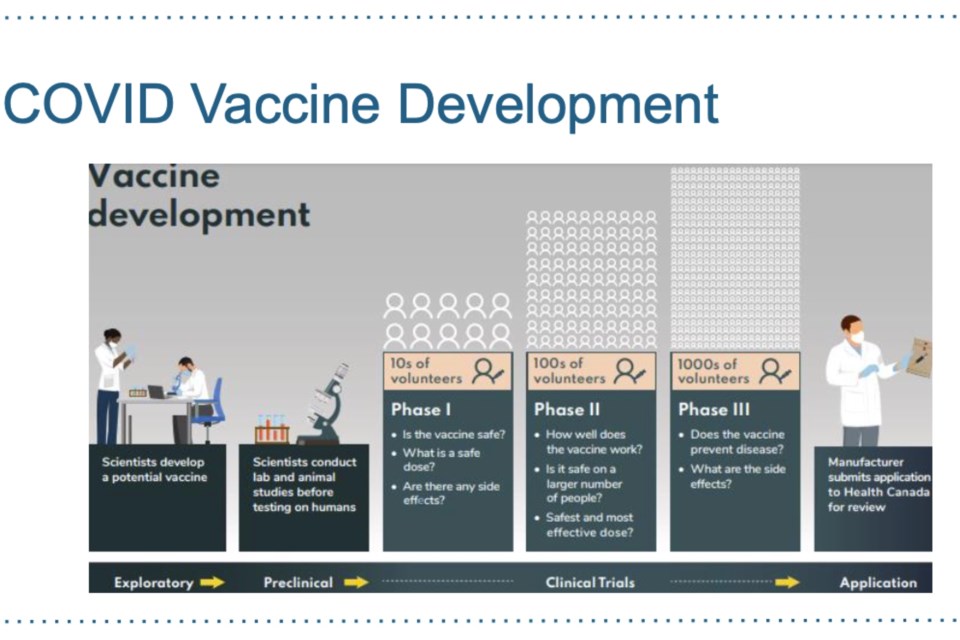BARRHEAD-Should people who have been infected with COVID-19 receive the vaccine? How long should they wait to get it? And what’s the differences between the four brands of COVID-19 vaccines?
These questions and others were answered on March 9 as part of a COVID-19 Conversation conducted over Zoom between the public and Alberta Health Services (AHS) officials in the North Zone, which encompasses Barrhead, Westlock and Athabasca.
While different officials weighed in on the “conversation,” most of the comments made during the presentation were provided by Dr. Kristin Klein, AHS North Zone Medical Officer of Health.
One of the first subjects Klein addressed were the COVID-19 variants of concern, two of which (the UK and South African strains) have been identified in Alberta.
She said it is common for viruses to change over time, but what’s concerning about the variants is that they are regarded as more contagious and can spread more easily.
As the number of variant cases in Alberta have been slowly growing over the past several weeks, there is some concern that they could become the dominant strain here in Alberta and the rest of Canada, Klein indicated.
AHS has taken additional steps to control the spread of these variants, including the creation of a dedicated variant of concern (VOC) team to conduct modified contact testing. There are also specific measures in place to control outbreaks of the variants of concern.
“It’s also important to remember that with the variants of concern, the same measures that they use for other kinds of COVID also work there,” she said, adding that this includes frequent hand-washing, mask-wearing and social distancing.
Later, Klein answered a question about whether it is possible to get the COVID variants if a person has already been infected with the virus.
Without getting into complex immunology, Klein indicated it is likely that a person infected with the regular strain of COVID-19 can be re-infected by the variant, as their immune system wouldn’t know how to defend against it. That said, there’s not enough evidence to say how likely that is.
Vaccine development
The next subject Klein touched on was the speed with which vaccines were developed for COVID-19, noting that many people are concerned with whether or not all the necessary steps were followed to properly develop them.
Klein discussed the various phases of trials that the vaccines go through, starting with lab and animal trials and followed by three phases of testing on volunteers, with more people being added with each phase.
In particular, Phase 3 of volunteer testing (which involves thousands of people) shows how well the vaccines prevents the spread of COVID-19 on a large scale and what kind of side effects they may cause.
The data from all of these phases goes into Health Canada’s consideration of whether the vaccines can be made available.
“Health Canada is the ultimate decision-maker about what medications, including vaccines, are available to be sold and then used within the country,” she said.
One interesting aspect of the development of COVID-19 vaccines is that the manufacturers entered into agreements with Health Canada to provide them data from each of the testing phases, Klein said.
Having all that data supported quick decision-making on Health Canada’s part, Klein noted, adding that just because it seems to have happened quickly “doesn’t meant that any steps were skipped.”
Even after the vaccines begin being administered, there is constant monitoring to ensure the vaccines are safe for use and that the risks of side effects do not outweigh the benefits of protecting Canadians from COVID-19.
Vaccine differences
Klein then discussed the four different brands of COVID-19 vaccines. The Pfizer-BioNTech and Moderna vaccines are known as mRNA vaccines, while the Astrazeneca/Covishield and Janssen vaccines are “viral vector” vaccines.
What’s the difference? The mRNA vaccines give cells the instructions on how to make the spike proteins that fight COVID-19, while the “viral vector” vaccines use a weakened form of the virus that teach cells how to form the appropriate spike proteins.
The mRNA vaccines are 95 per cent effective at preventing symptomatic COVID-19 and require two doses, while the viral vector vaccines are 65 per cent effective at preventing symptomatic COVID-19 and may only require one dose. They also have different storage requirements.
Both types are effective at preventing serious outcomes like hospitalization, and Klein urged listeners to get the vaccine regardless of what type it is. Only people who have demonstrated severe hypersensitivity to vaccines or anaphylaxis (an allergic reaction to vaccines) should not get them.
Klein stressed that the vaccines themselves cannot give a person COVID-19 to a person.
Vaccinated spreader?
As noted earlier, being vaccinated means a lower chance of being infected by COVID-19 or experiencing severe outcomes. But could a person who is vaccinated still spread the virus to others, perhaps as an asymptomatic carrier?
Klein admitted that they simply don’t know if those vaccinated can be carriers of the virus, which is why it will still be important to follow public health measures for a time.
She stressed that no is to blame for getting COVID-19 and that it is important not to shame anyone for doing so, as they need Albertans to feel comfortable with coming forward and participating in contact tracing.
When asked if someone who has gotten COVID-19 needs to get vaccinated, Klein said they recommend everyone to get the vaccine whether they have had COVID-19 or not.
Even if they gain some measure of immunity from having the virus, getting the vaccine will ensure that immunity is longer-lasting, she said.
That said, if you are showing symptoms of COVID-19 or are required to be in isolation for another reason (ie. coming into close contact with a carrier), it’s important to stay home.
“We don’t want anybody who still needs to legally isolate to come to any of our public clinics,” she said.



.jpg;w=120;h=80;mode=crop)